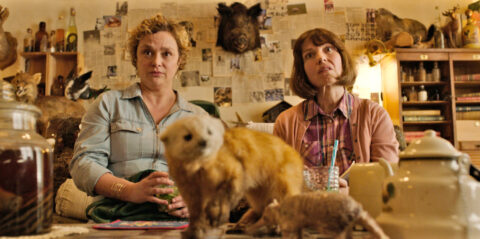It comes as no surprise that Jean-Christophe Meurisse’s Plastic Guns (2024) opens with a brutal shot of a dead woman on a morgue table being chopped open by two men as they flippantly talk about Netflix serial killer documentaries.
Meurisse’s previous film, Bloody Oranges (2021), was the darkest of dark comedies — a nasty little farce with a third act that erupts into unhinged madness as a young woman unleashes vengeance on her abductor by castrating him, heating his testicles in a microwave and serving them to him on a fork. Unlike Bloody Oranges, which saves the shocks for the last act, Plastic Guns goes for a massive “Fuck you” energy from the start. It’s hilarious.
(Side note: the opening joke is the only unfunny one in the movie and reminds me of Bones and Names’ (Fabian Stumm, 2023) groan-inducing self-referencing opening scene in which an artsy-fartsy gay couple debate the pros-and-cons of showing male nudity on screen, and then the actor gets up and shows his penis. Grow up.)
A madcap, chatty farce about mistaken identity involving a French man arrested in Denmark wrongfully accused of murdering his family, and the two bumbling “Facebook detectives” attempting to get to the bottom of things, the film opens with a goofy 70s comedy tone.
Our inept dipshit hero Zavatta (Anthony Paliotti) strolls through the airport to a groovy tune, trying to be suave but choking on the toothpick in his mouth. He crosses paths with a guy who looks a bit like a suspected murderer. But is it really him?
Soon we’re bouncing between Danish interrogation rooms and Argentinean weddings while goofball sleuths (and a handful of other bizarre characters) jump on the case.
It’s playful, weird, and constantly surprising. But it’s not just the plotting that’s completely unpredictable; the things that come from people’s mouths are never what you expect. The dialogue is fast and furious, filled with irony and wild swerves. Racist tirades from random characters. Two detectives debating Celine Dion’s interior design aesthetics. A woman on an airplane oversharing personal medical stuff. All this creates a singular, offbeat tone with sharp edges.
This endless desire to mock and provoke polite society with borderline indecency and stomach-churning imagery recalls John Waters’ early work, like Female Trouble (1974) or Multiple Maniacs (1970). Once you get past the crass exterior you’ll find a joie de vivre and light-heartedness (if you don’t mind a little bit of rape and castration thrown in).
The music is a constant slay. The needle drops come on so fun and inspired (ranging from The Clash to Death Metal to Mahler, plus a heavy dose of French sleaze), they put the Kill Bill movies (Quentin Tarantino, 2003-4) to shame.
Shitposty edgelord cinema will always divide audiences, but it’s lazy to dismiss Plastic Guns (and Bloody Oranges) as empty provocation. Meurisse swings at everything in his eyesight He’s an equal opportunity offender, an agent of controlled chaos and clearly one of the wittiest directors currently working.
Jared loves movies and lives with Kiki in Berlin.
